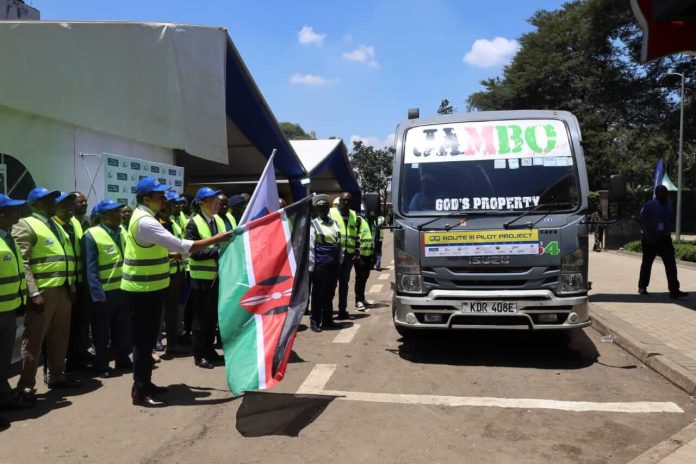On April 11, 2025, the Japan International Cooperation Agency (JICA) Kenya Office, in collaboration with the Nairobi Metropolitan Area Transport Authority (NAMATA), officially launched the Route 111 Pilot Public Bus Service at the Pioneer Moi Avenue pilot terminus in Nairobi.
The event brought together a wide range of stakeholders from both national and county governments. The ceremony was presided over by Mr. Mohamed Dhagar, Principal Secretary for the State Department for Transport under the Ministry of Roads and Transport. Representatives from the Nairobi and Kajiado County Governments, the National Transport and Safety Authority (NTSA), the National Police Service, the Kenya National Highways Authority (KeNHA), and the Kenya Urban Roads Authority (KURA) were in attendance, as well as heads of the participating bus operators, including Enabled, Super Metro, Metro Trans, NTVRS, Nangkis, MCA, Ngokana, Latema, and Raj Safaris.
This pilot initiative, which will run for one month until May 2, 2025, is designed to deliver a public transport service that is reliable, safe, comfortable, and well-scheduled. The project introduces structured operations, standardized fare systems, improved service facilities, and incorporates gender mainstreaming — all underpinned by comprehensive training for both drivers and conductors. Customer satisfaction surveys and financial assessments will be conducted during the pilot phase, and the results will inform future improvements to Nairobi’s public transport network.
In his remarks, JICA Kenya Chief Representative, Mr. Shinkawa Makoto, highlighted the agency’s long-standing commitment to enhancing Nairobi’s urban mobility. He underscored JICA’s goal of supporting the development of a public transport system that enables all city residents to travel safely and efficiently. Mr. Shinkawa also reflected on JICA’s history of cooperation with the Kenyan government, noting milestones such as the Nairobi Transport Masterplan (2006) and the Nairobi Integrated Urban Development Master Plan (NIUPLAN, 2014). These plans continue to serve as strategic frameworks guiding the city’s infrastructure development.
Further, Mr. Shinkawa emphasized JICA’s contributions to the expansion of critical road infrastructure, including Ngong Road and Western Ring Road, and the agency’s collaboration with Kenyan authorities on sustainable road maintenance initiatives. He also noted the significance of JICA’s 2019 study on road safety within the Matatu sector, which laid the groundwork for the Route 111 pilot.
JICA reaffirmed its commitment to working closely with the Government of Kenya to strengthen public transportation systems and contribute to Kenya’s broader social and economic development goals.
This pilot marks a significant step toward building an integrated, safe, and accessible public transport network that meets the needs of Nairobi’s growing urban population.

